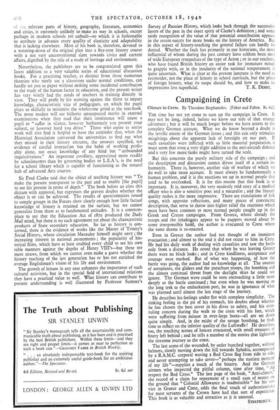Campaigning in Crete
Climax in Crete. By Theodore Stephanides. (Faber and Faber. 8s. 6d.) THE time has not yet come to sum up the campaign in Crete. It may not be long, indeed, before we know our side of that strange adventure • but it will be much longer before we have access to the complete German account. What we do know beyond a doubt is the terrific extent of the German losses ; and this can only stimulate misgivings about the apparent lack of foresight on our part. If such casualties were inflicted with so little material preparation, it must seem that even a very slight addition to the anti-aircraft defence and a very few more Tanks might have turned the scale.
But this concerns the purely military side of the campaign ; and the description and discussion cannot divest itself of a certain in- humanity. There is, however, another side of warfare of which we do well to take more account. It must always be fundamentally a human problem, and it is the reactions set up in normal people that tend to 'be overlooked. It is for this reason that this book is so important. It is, moreover, the very modestly told story of a medical officer who is also -a -sensitive poet and a naturalist ; and the literary quality makes it_the more impressive. There are translations of folk songs, with apposite reflections, and many pieces of convincing description, that serve to throw into higher relief the reactions which must have been common to most normal peOple caught up in the Greek and Cretan campaigns. From Gteece, where already the troops and the inhabitants appear to be puppets moved about by some irresponsible harM, the author is evacuated to Crete where the same drama is re-enacted.
Even in Greece the author had not thought of an imminent evacuation ; and almost to the end it did not occur to him in Crete. He had his daily work of dealing with casualties and saw the battle only from a distance. He noted that when he was leaving Greece there were no black looks ; and in Crete kindliness, acceptance and courage were marked. But of what was happening, of how the battle was going, the author had no knowledge at all. The swarms of aeroplanes, the gliders and the parachute troops, the bombing and the almost continual threat from the daylight skies he could not ignore. The German wave could be seen encroaching a little more deeply as the battle continued ; but even when he was moving on the long trek to the embarkation port, he was in ignorance of what was planned until almost the last stage of the journey.
He describes his feelings under fire with complete simplicity. The sinking feeling in the pit of his stomach, his doubts about whether he has chosen the best cover in his dives to .safety, and his over- ruling concern during the walk to the coast with his feet, which were suffering from misuse in over-large boots—all are set down quite simply. And, in the midst of the savage bombing, he finds time to reflect on the inferior quality of the Luftwaffe ! He describes, too, the touching scenes of houses evacuated, with small treasures of finery left behind ; and he tells a number of the stories that lightened the tiresome journey to the coast.
The last scene of the wounded, by order bunched together, without helmets, slowly moving down the hill towards Sphakia, accompanied by a R.A.M.C. corporal waving a Red Cross flag from side to side, and never attempting to take cover—" perhaps the nastiest moment of my life "—supplies a touch of the bizarre. And the German airmen who inspected the pitiful column, time after time, "did respect the Red Cross." The last page of the book, " Anti-climax," the record of a claim for repayment of a small sum of money on the ground that " Colonial Allowance is inadmissible " for his ser- vice in Greece and Crete, adds the final touch of authentication ; for most servants of the Crown have had that sort of experience. This book is as valuable and attractive as it is unusual,
STRATE*GIcus.






























 Previous page
Previous page